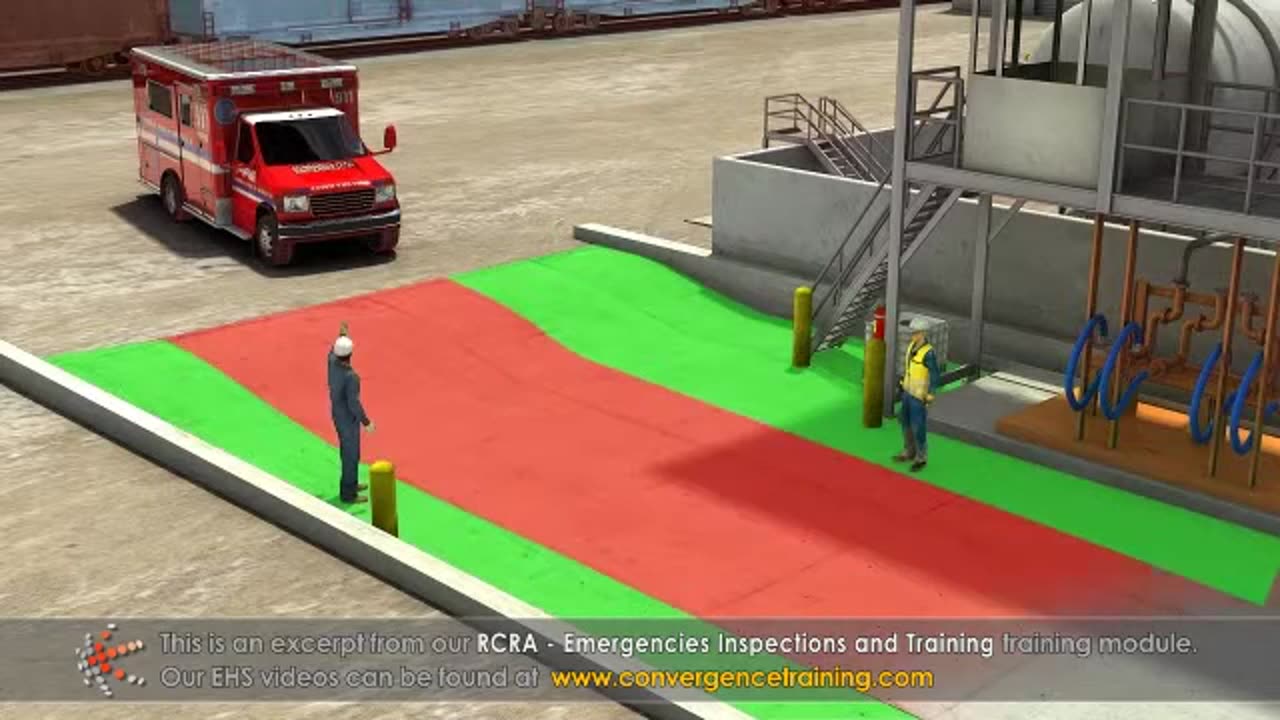Premium Only Content

RCRA - Emergencies, Inspections, and Training
**RCRA (Resource Conservation and Recovery Act) Training: Emergencies, Inspections, and Training** focuses on proper hazardous waste management practices, ensuring compliance with RCRA regulations, and preparing employees for emergencies. Here's a detailed outline:
---
### **1. Overview of RCRA**
- Purpose of RCRA: Managing hazardous and non-hazardous waste to protect human health and the environment.
- Regulatory framework and key agencies (EPA oversight).
- Applicability of RCRA to different facilities (Large Quantity Generators, Small Quantity Generators, and Conditionally Exempt Small Quantity Generators).
---
### **2. Emergency Preparedness and Response**
- **Emergency Procedures**:
- Identifying potential hazards and risks at the facility.
- Creating and implementing contingency plans.
- Steps to follow during emergencies involving hazardous waste (e.g., spills, fires, explosions).
- **Emergency Equipment**:
- Maintaining and locating spill kits, fire extinguishers, and alarms.
- Communication systems for alerting authorities and workers.
- **Emergency Coordinators**:
- Roles and responsibilities of the designated emergency coordinator.
- Coordination with local emergency responders (e.g., fire departments, HAZMAT teams).
- **Evacuation Procedures**:
- Developing clear evacuation routes and procedures.
- Conducting drills and ensuring all employees are familiar with the plan.
---
### **3. Inspections Under RCRA**
- **Inspection Requirements**:
- Regular inspections of hazardous waste storage areas.
- Frequency and documentation of inspections (e.g., weekly for containers, daily for tanks).
- **Inspection Checklists**:
- Inspecting containers for leaks, corrosion, and proper labeling.
- Verifying secondary containment systems.
- Ensuring emergency equipment is in working order.
- **Documentation**:
- Maintaining accurate inspection logs for regulatory compliance.
- Recording identified issues and corrective actions.
---
### **4. Training Requirements**
- **Who Needs Training**:
- Employees handling hazardous waste.
- Emergency coordinators and facility operators.
- **Training Content**:
- Hazardous waste identification and classification.
- Proper waste handling, storage, and labeling.
- Emergency procedures and use of emergency equipment.
- **Frequency of Training**:
- Initial training for new employees within six months of hire.
- Annual refresher training to maintain compliance and awareness.
- **Documentation**:
- Keeping records of training sessions, attendance, and topics covered.
- Ensuring records are accessible for inspections.
---
### **5. Hazardous Waste Handling and Storage**
- Proper labeling and dating of containers.
- Maintaining separation of incompatible materials.
- Ensuring storage limits and timeframes are not exceeded.
- Secondary containment and spill prevention measures.
---
### **6. Reporting and Recordkeeping**
- Incident reporting to the EPA or state agency.
- Preparing and submitting Biennial Reports (for Large Quantity Generators).
- Retaining inspection logs, manifests, and training records.
---
### **7. Regulatory Non-Compliance Consequences**
- Penalties for non-compliance (e.g., fines, legal action).
- Real-life examples of facilities penalized for violations.
- Best practices to avoid common compliance issues.
---
### **8. Closing and Q&A**
- Recap of key responsibilities under RCRA.
- Open discussion to address specific facility concerns.
- Distribution of checklists, handouts, and contact information for support.
---
**Optional Enhancements**:
- **Interactive Exercises**: Spill response simulations or inspections walkthroughs.
- **Assessment Quiz**: Evaluating participants' understanding of RCRA rules and emergency procedures.
- **Certification**: Providing certificates for successful training completion.
Would you like help creating materials such as emergency checklists, training slides, or customized inspection logs?
-
 3:18
3:18
HSESafetyInformation
17 days agoDahi Champ (Mutton Chops) Recipe By Food Fusion
45 -
 47:39
47:39
Michael Franzese
4 hours agoJewelry King Trax NYC EXPOSES How the Powerful Steal from You
45.3K8 -
 LIVE
LIVE
Slightly Offensive
3 hours ago $2.86 earnedCandace REDPILLS the Masses in BOMBSHELL Theo Von Interview | Guest: Shane Cashman
1,084 watching -
 LIVE
LIVE
megimu32
3 hours agoON THE SUBJECT: IRL Streamers Attacked & Nostalgic Animal Movies That Made Us Cry
368 watching -
 1:00:54
1:00:54
The Tom Renz Show
7 hours agoMore Epstein/FBI, a Scary Trade War, & the Dem Echo Chamber
7.49K1 -
 40:43
40:43
Kimberly Guilfoyle
8 hours agoDems Double Down on Delusion-Why? Live with Tony Kinnett & Bo French | Ep.202
77.8K31 -
 1:28:42
1:28:42
Redacted News
6 hours agoBREAKING! SOMETHING BIG IS HAPPENING IN EUROPE ALL OUT WAR IS COMING AGAINST RUSSIA, TRUMP FURIOUS
121K272 -
 47:50
47:50
Candace Show Podcast
6 hours agoBREAKING: Judge Makes Statement Regarding Taylor Swift's Text Messages. | Candace Ep 155
113K109 -
 1:14:23
1:14:23
Josh Pate's College Football Show
3 hours ago $0.29 earnedCFB’s Most Hated Teams | FSU & Clemson Future | Big Ten Win Totals | Star Rankings Overrated?
14.5K -
 1:33:47
1:33:47
CatfishedOnline
5 hours agoGoing Live With Robert - Weekly Recap
27.8K